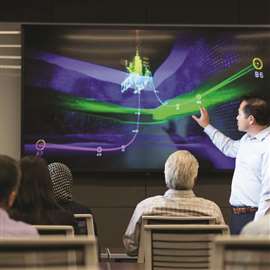Betting on ‘waste management’
April 21, 2025
An interview with Daniela Abate, VP of CCUS at Baker Hughes
 Baker Hughes said its pre-FEED and FEED design and consultation supports even the most complex CCUS project development. (Image: Baker Hughes)
Baker Hughes said its pre-FEED and FEED design and consultation supports even the most complex CCUS project development. (Image: Baker Hughes)
When Daniela Abate joined Baker Hughes’ Industrial & Energy Technology segment as part of the business’ Climate Technology Solutions organization which focuses on the development and deployment of solutions to enable the energy transition - carbon capture, utilization, and storage (CCUS) was a whisper on the fringe of mainstream energy discourse. Fast forward to today, Baker Hughes has been hard at work building out a diverse portfolio of CCUS technology solutions to serve a market with a trajectory set firmly on reshaping the world’s carbon economy.
As Vice President of CCUS at Baker Hughes, Abate oversees a growth area that bridges decades of oil and gas expertise with the pressing demands of a decarbonized future. “CCUS is really about waste management,” she says. “Only this time, the waste is CO₂.”
Owning the Entire Value Chain
CCUS is a complex ecosystem that includes capture, transportation, storage, and utilization. What sets Baker Hughes apart, Abate said, is the company’s unique ability to operate across every segment of that value chain.
“We leverage our legacy,” she says. “Our turbomachinery has handled CO₂ compression and transport for years, and our oilfield services business builds upon decades of management of underground resources.”
But Baker Hughes isn’t just relying on its past. Since 2020, the company has expanded its technology stack through acquisitions, strategic partnerships and ongoing research & development with the objective of providing a diversified suite of solutions to meet a variety of customer needs and operating environments. These include:
 Daniela Abate
Daniela Abate
The acquisition of Compact Carbon Capture and Industrial Climate Solutions (ICS), both focused on developing technology to address process intensification that reduce equipment size and capex for post-combustion capture.
A partnership with SRI International for the mixed salt process, a novel and environmentally friendly post-combustion technology.
The acquisition of Mosaic Materials, a Berkeley spin-off pioneering direct air capture using solid sorbents.
Equity in Electrochaea, a company delivering a novel biomethanation technology to produce synthetic methane by combining captured CO₂ with green hydrogen.
Infrastructure, Economics, and Social License
Despite the technology strides, Abate is quick to underscore that CCUS’s success hinges on more than innovation. “We need the same level of commitment from governments as we saw with waste management and water infrastructure,” she notes. “Technology alone won’t cut it.”
The equation is complex: project developers require long-term financing, insurance for CO₂ storage liability, and public acceptance for infrastructure buildouts. In many cases, opposition to CCUS projects, such as the development of a new onshore CO2 pipeline, is strong. Moreover, a market mechanism for low-carbon products is still missing. “There’s no premium yet for a decarbonized product.”
Early-Stage Projects and Regional Ecosystems
While many projects remain under wraps due to secrecy obligations, Abate describes active engagements in North America, Europe, and APAC. From fertilizer and ammonia producers to industrial clusters and project developers, each with unique needs.
The requirement for regional solutions makes CCUS comparable to LNG markets: “We’re observing the development of regional ecosystems, such as industrial clusters and storage hubs that enable economies of scale.”
The Digital Edge
To bring coherence to these fragmented systems, Baker Hughes has developed CarbonEdge, a digital platform powered by Cordant, a modular, AI-enabled industrial enterprise solution designed to optimize assets, processes, and energy use at scale. CarbonEdge enables tracking, certification, risk management, and verification of carbon molecules across the value chain—a crucial step in establishing trust in long-term CO2 storage.
“We’re piloting this with Wabash Valley Resources in the U.S.,” Abate shares. “It’s especially valuable for project developers, who need support across the full project lifecycle.”
Looking Ahead: The Market is Unlocking
After years of groundwork, momentum is building. Projects like Net Zero Teesside and Denmark’s Greensand are reaching final investment decision (FID), signaling a turning point.
“Governments are now acting as catalysts,” Abate says. Still, she cautions, these are long, capital-intensive efforts. “Net Zero Teesside raised 4 billion in debt. It takes time. But the market is unlocking.”
A Growing Business
When Abate reflects on the journey, she mentions Baker Hughes’ CCUS business has grown a lot and fast, engaging on multiple projects including most recently with Frontier Infrastructure to accelerate the deployment of large-scale carbon capture and storage (CCS) and power solutions in the U.S.
“There’s no doubt—CCUS is a critical lever in the net-zero transition,” she says. “And we’re building the infrastructure to make it real.”
MAGAZINE
NEWSLETTER

CONNECT WITH THE TEAM







